Explaining the S Sudan peace agreement (2): When will the new govt be formed?

'Focus on the Agreement' is a new daily segment broadcast on Radio Tamazuj to explain the contents of the peace agreement signed in August 2015 between South Sudan's warring parties. Many South Sudanese have never read the agreement or heard any detailed explanation of what it says. 'Focus on the Agreement' summarizes key parts of the deal in daily broadcasts, not translating every detail but highlighting the basics.
Yesterday we explained the prologue of the agreement. Today we look at Chapter 1, Article 1, which is about the establishment of the transitional government.
The Transitional Government of National Unity
According to this part of the agreement, the name of the new government will be the “Transitional Government of National Unity.”
This government of unity has not yet been established. In the agreement, the current period is called the “pre-transitional period,” during which the government will remain under the control of only one of the warring parties, without power-sharing. This period will last for 90 days from the date of signing, in other words, until late November. From that time, the new power-sharing government will begin and will rule for 30 months, from late this year until the middle of the year 2018.
The term of the current president shall be extended for the duration of the Transitional Period, according to the agreement. The current vice president will also remain as vice president, while a new position of first vice president will be created. According to the agreement, elections must be held 60 days before the end of the Transitional Period. Until that time, the different parties will share power on the basis of an agreed ratio.
This ratio gives 53% of the positions in the national council of ministers to the current ruling SPLM faction led by Salva Kiir. It gives 33% of positions to the armed opposition and 7% to the SPLM Former Detainees. The last 7% of positions will be given to other political parties. However, these ratios are different in the states. The agreement explains more details about this in later sections.
Finally, the peace agreement states that Juba will be the capital of the transitional government.
Tomorrow we will look at Chapter 1, Article 2, which is about the mandate of the Transitional Government of National Unity.